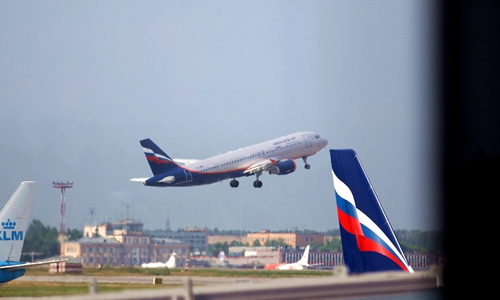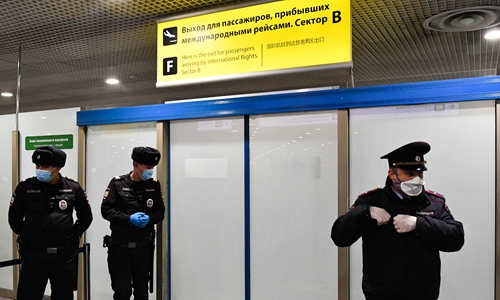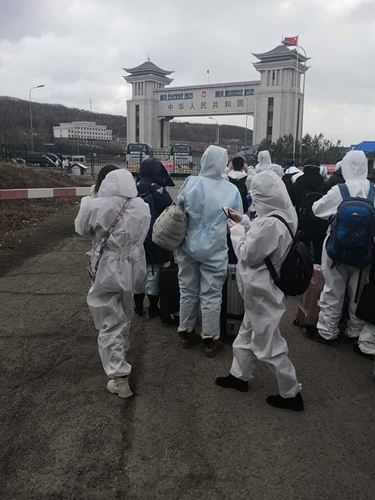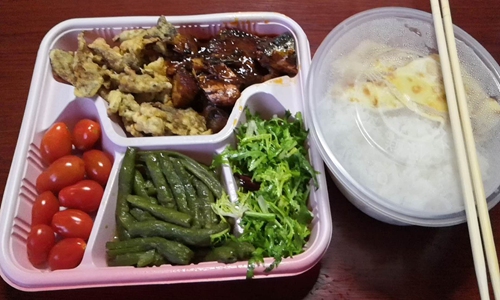Without eating or going to bathroom, returnees from Russia endure 26-hour journey back to China
By Zhao Juecheng Source:Global Times Published: 2020/4/11 0:42:47 Last Updated: 2020/4/12 18:42:47

An Aeroflot flight departs from Terminal D at Sheremetyevo airport, Moscow, Russia on June 28, 2013. Photo: cnsphoto
"Since the outbreak of the novel coronavirus, there had been no confirmed cases in Suifenhe. The virus might have no idea where the city is." This was a joke made by people living in Suifenhe of Northeast China's Heilongjiang Province.
But in recent days, Suifenhe has become a new battleground for fighting the virus after the local authority released a notice on April 7 imposing closed-off management on all residential communities.
The high risk the city faces comes from Chinese nationals returning home from Russia through the port of Suifenhe.
Heilongjiang, the province that administers Suifenhe, reported 21 new imported COVID-19 cases on Saturday, all from Russia, bringing the total imported confirmed patients through the port of Suifenhe to 194, the local health authority said Sunday. The port also reported 121 asymptomatic patients.
Cao Jie (pseudonym) is one of the 2,497 people who returned to China. He was on flight SU1702 from Moscow to Vladivostok on April 6 and 26 hours later, he finally checked in at a designated hotel in Suifenhe.
"I have no feelings or thoughts right now. Just that I'm finally back home." Cao's hometown is in East China's Jinhua and he has run businesses in Moscow's Sadovod market for years. The market district is also one of the places in Russia where there are many Chinese.
Since the outbreak of COVID-19, the market has been suspended and many Chinese businesspeople have been considering coming back to China.
Since Saturday, 2,186 more people have tested positive for COVID-19, bringing Russia's total novel coronavirus tally to 15,770, Russian media reported.

An Aeroflot flight departs from Terminal D at Sheremetyevo airport, Moscow, Russia on June 28, 2013. Photo: cnsphoto
Cao said that some of his friends in Moscow have been infected but as they have mild symptoms, they have been asked to self-isolate. One of Cao's Vietnamese clients in Moscow was admitted to hospital after having a fever for almost 2 weeks.
"If you've been in that situation, you can understand our feelings. With people around us getting infected one by one, how can you not be nervous?" Cao told the Global Times.
Although the Russian government has taken a series of prevention measures, many residents in Moscow seem not to pay enough attention to the pandemic and the risk of being infected is high.
Cao saw the streets crowded with vehicles and people and made the decision to return to China.

Cao Jie and other Chinese walking to the Chinese border gate. Photo: Courtesy of Cao Jie
Since China and Russia imposed limitations on international flights at the beginning of April, there is only one direct weekly flight from Moscow to China and tickets are hard to get. Flying from Moscow to Vladivostok and then driving to China via Suifenhe has become the best option for Cao and other Chinese to get back to China from Russia.
When Cao arrived at Moscow airport, he immediately saw many Chinese waiting for the same flight as they were easy to recognize - all wearing masks, gloves, goggles and protective suits. These are protective measures that few Russians take, he said.
Cao and the other Chinese flew 8 hours from Moscow to Vladivostok.
Out of concern of getting infected in the confined cabin, Cao had prepared. He adapted a portable drinking machine, linking an infusion tube to a water bottle to make sure he could drink without taking off his mask. He also brought dried beef to avoid eating during the flight. And he wore a diaper.

Meals provided for travelers during quarantine Photo: Courtesy of Cao Jie
Without eating, moving or going to the bathroom, Cao and more than 30 other passengers endured the 8-hour flight. They recalled getting curious looks from Russian passengers and crew.
"They might've thought we were all patients but what worried us was them," Cao said, noting that Moscow airport had no procedures in place to take passengers' temperature before getting on planes and the Russian cabin crew only wore normal masks. Just 40 percent of Russian passengers wore masks, according to his observation.
"Although it was uncomfortable, I had to 'cover' myself to avoid being infected or infecting others," Cao said.
It turned out that Cao was not overreacting. According to Heilongjiang health commission, five passengers on Cao's flight have been confirmed with infection.
Cao finally landed in Vladivostok around midnight on April 7. Without delay, he took a bus from the airport to Suifenhe-Pogranichny port.
Two hours later, after walking through the Russian port and seeing the border gate to the Chinese side, Cao told himself, "I am finally back."
Walking to the border gate, Cao and the 30 other Chinese were welcomed by customs officers, doctors and police officers all wearing protective suits.
They were given nucleic tests, health declaration forms to fill out and were taken to a stadium in Suifenhe to wait for the test results. People whose temperatures were abnormal, were sent to other places.
Newspaper headline: Germ-free journey
Posted in: SOCIETY